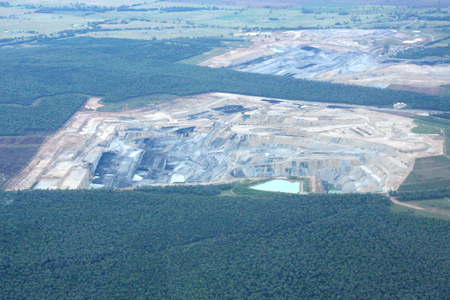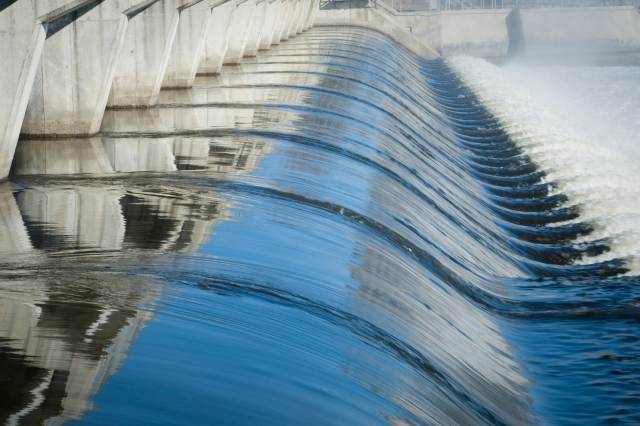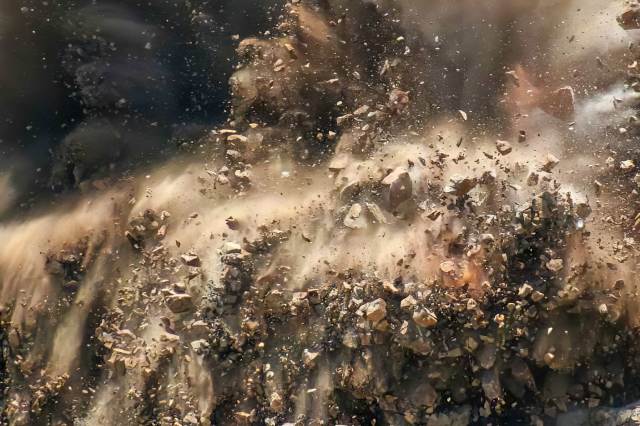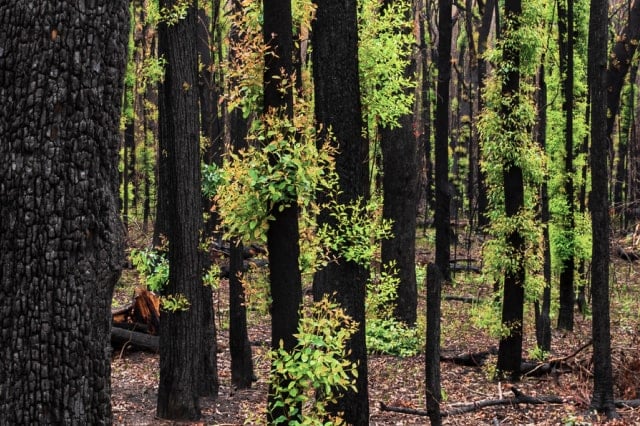Unlike diversified miners like BHP and Rio Tinto, Whitehaven Coal makes money by doing just one thing: digging coal out of the ground so it can be burned in power plants and steel mills. Whitehaven operates five open-cut mines and one underground mine in north-western NSW’s Gunnedah Basin, and it is seeking government approval to open two more. Each year the company produces more than 20 million tonnes of thermal coal (used in power plants) and metallurgical or ‘coking’ coal (used to make steel) which it exports to south-east Asian countries including Japan, Korea, Taiwan and India.
Whitehaven’s most recently constructed mine is Maules Creek (see below), which began its life in 2011-12 when the company completed a $5.1 billion merger with Nathan Tinkler’s Aston Resources. In December 2013, after a protracted fight with environmental groups that went all the way to the Federal Court, Whitehaven was given permission to mine 12 million tonnes of coal a year for 30 years at the Maules Creek site. Environmental groups were strongly opposed to the mine which required the clearing of 1,500 hectares of Leard State Forest. The forest is designated a Tier 1 Biodiversity Area by the NSW government and is home to 34 threatened species including koalas and masked owls. According to the NSW government, Tier 1 areas “cannot sustain any further loss” and are “critical to biodiversity persistence”.

During the approval process, one activist named Jonathan Moylan went as far as to send a hoax press release to journalists claiming ANZ had withdrawn its $1.26 billion loan facility for Maules Creek due to sustainability concerns. The press release was published by major news organisations which caused Whitehaven’s sharemarket value to briefly slump by $314 million. Activists also blockaded Whitehaven’s construction of the mine and several hundred people, including former Australian rugby captain David Pocock, were arrested after they chained themselves to machinery. But despite the efforts of protestors the mine went ahead and produced 7.4 million tonnes of coal in its first year of commercial production during 2016-17. The following year production at Maules Creek increased to an annualised rate of 10.5 million tonnes of coal per annum. Freedom of information requests in 2017 revealed Whitehaven has breached its environmental licence on numerous occasions for contaminating nearby streams and creating excessive air pollution.
Whitehaven is currently seeking approval for two new coal mines: an extension of the Vickery project north of Gunnedah, NSW and the Winchester South project in south-east Queensland’s Bowen Basin. Whitehaven wants approval to extend the Vickery mine from 4.5 million to 10 million tonnes per annum. The Winchester South project is at an earlier stage but Whitehaven says it has potential for run-of-mine production of up to 15 million tonnes of coal per annum. Whitehaven chief executive Paul Flynn talked up the projects in October 2018 ahead of the company’s annual general meeting (AGM), claiming that state governments are aiming to get the approval process for new mines down to 500 days. It took 1,300 days for the Maules Creek project to receive all of its approvals from the NSW government.
Climate risks ignored
Whitehaven was put under pressure by a small group of shareholders at its 25 October 2018 AGM to disclose its climate change risk. In an ASX statement early that month the company said its “high quality, low emissions coal” was being used by its customers in South East Asia to run so-called High-Efficiency Low-Emission (HELE) power stations that produce “significantly lower emissions than conventional coal-fired power stations”. Whitehaven also cited the International Energy Agency’s (IEA) base case New Policies Scenario (NPS) as the model it uses to make its investment decisions. Under that scenario, demand for coal will continue to increase worldwide and more than double in South East Asia (Whitehaven’s target market) by 2040. A 2018 report published by US advocacy group Oil Change International said the NPS describes an energy future where the world is on course for between 2.7°C and 3.3°C of warming. It is a scenario that would lead to “climate disaster”, says the report – and it’s not hard to see why. An Intergovernmental Panel on Climate Change (IPCC) report released in October 2018 warned that the 2015 Paris Agreement to keep global temperatures 2°C below pre-industrial levels does not go far enough. The report found that even 1.5°C of warming will be enough to lead to irreversible changes to the planet, including the destruction of 99% of the Great Barrier Reef and the displacement of tens of millions of people due to rising sea levels. That puts the 2.7°C-3.3°C warming being modelled by Whitehaven into perspective. Oil Change International described the recklessness of the International Energy Agency’s modelling and its impact in Australia this way:
The NPS is helping enable massive expansion of thermal coal mining in Australia, by informing both supportive government policies and regulatory approval of new mines.
Australian Ethical does not invest in any coal mining companies. Unfortunately, the same cannot be said of some of Australia largest super funds. As at 30 June 2018 AustralianSuper’s balanced investment option held $63.3 million in Whitehaven shares, and as at 31 March 2018 Hostplus held $34.2 million in Whitehaven shares. Consider Australian Ethical for your super so your retirement savings aren’t funding coal mines.
What are you investing in?



